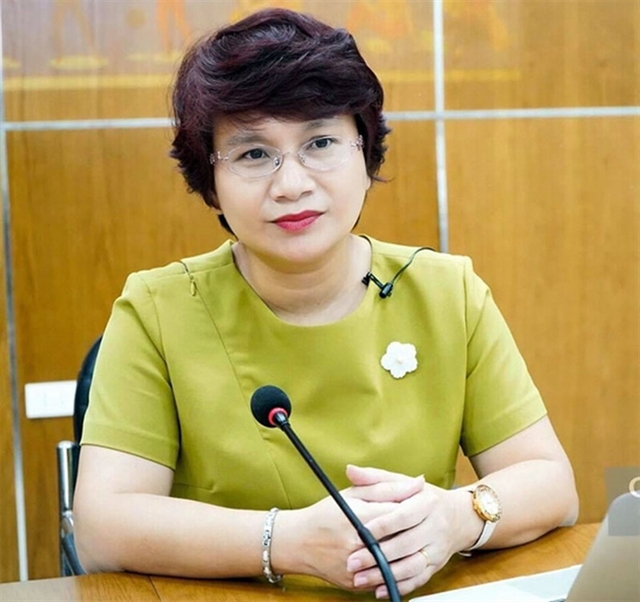.jfif) Opinion
Opinion

Director of the Higher Education Department under the Ministry of Education and Training Nguyễn Thu Thuỷ speaks to Báo điện tử chính phủ (Online newspaper of the Government) about the newly-promulgated regulation on PhD enrolment and training

|
| Director of the Higher Education Department Nguyễn Thu Thuỷ |
Director of the Higher Education Department under the Ministry of Education and Training Nguyễn Thu Thuỷ speaks to Báo điện tử Chính phủ (the Government e-newspaper) about the new regulation for PhD enrolment and training
Deputy Minister of Education and Training, Hoàng Minh Sơn, recently signed a circular to instruct the implementation of the regulation on PhD enrolment and training. Could you tell us the reason for promulgating the new regulation?
The newly-promulgated regulation, which is set to become valid on August 15, 2021, has been issued after the old regulation issued in 2017 showed shortcomings because it was no longer consistent with the provisions of the Law on Higher Education and the Decree No 99/2019/NĐ-CP that instructed the implementation of the law.
After four years of implementing the old regulation, reports from PhD training institutions show that a number of provisions needed to be adjusted to ensure compliance with reality as well as improving the autonomy and accountability of training institutions.
These related to the rules for learners, instructors, members of assessment councils, enrolment and training management of offline and online study.
The view of the ministry was to inherit the positive and feasible rules from the old regulation as well as fixing the shortcomings. The new regulation adds more rules to strengthen academic integrity and emphasise the role of autonomy and accountability of higher education institutions under the Law on Higher Education.
What are the main points of the new regulation?
The new regulation has made scientific, objective and fair adjustments in PhD training. It will standardise rules on foreign languages and scientific research capacity of instructors and PhD students and have more-flexible rules for training management.
First, the new regulation asks PhD training institutions to take more responsibility when building PhD training programmes, enrolment, training and issuing certificates.
Second, it adds the requirements of foreign language proficiency (using national certificates according to the six-level foreign language framework used for Việt Nam in addition to internationally recognised certificates such as IELTS and TOEFL.)
Articles and scientific reports in the World of Sciences (WoS) and Scopus are still required to demonstrate the experience and scientific research results of both the instructor and the PhD students. The new regulation supplements the acceptance of monographs and publications in domestic journals under the recommendation of the State Council of Professors.
It also replaces scientific-research publications with nationally or internationally-patented research results and applications of science and technology.
Third, learners are permitted to reserve their learning outcomes for a certain period of time in order to continue studying and researching if there is a need.
It allows the increase of the number of PhD students for each instructor. It aims to attract and utilise the knowledge of qualified people to train future generations without reducing the quality of training.
Specifically, a professor can independently guide up to seven PhD students. An associate professor or a doctor of science can independently mentor up to five PhD students. A doctor is allowed to independently guide up to three PhD students.
The timelines for PhD training are also changed to meet practical training requirements.
The total standard training time is about three or four years. (It means the PhD student could complete the training programme one year earlier than the study plan instead of four years like before.)
The new regulation adds the recognition of scientific articles in prestigious domestic journals. Why is this necessary?
Việt Nam currently has more than 600 scientific journals and the State Council of Professors categorises more than 400 scientific journals as prestigious.
The quality of some prestigious specialised scientific journals in the country has improved over the past five years and should be recognised. We have a journal belonging to the SCIE (Science Citation Index Expanded) database; six journals belonging to the ESCI (Emerging Sources Citation Index) under the Web of Sciences; eight Scopus journals and 18 journals are indexed in the ACI (ASEAN Citation Index) database.
The recognition of domestic journals will be the driving force for domestic scientific journals to strive to improve their quality and reach international standards, thereby, promoting the attention in building domestic journals to international level.
The publication of research results through domestic reputable journals is believed to be a channel for valuable scientific products suitable to Việt Nam's conditions to reach a large number of interested people in the country. This is the recognition of research results to solve practical problems, contributing to consult and make policies in Việt Nam.
The new regulation also affirms the responsibility and contribution to the country of Vietnamese scientists and PhD students.
PhD training is the highest level of training in the national education system. Training must be standardised from enrolment to issuing a certificate, ensuring a screening mechanism in the training process and meeting international demands when Việt Nam has integrated into the international community. — VNS




